New Briefing Paper: “We Cannot Move Freely,” The Impacts of Martial Law on Civilians in Southeastern Burma
February 17, 2023
HURFOM: Since the attempted coup on 1 February 2021, armed clashes between the military junta and armed opposition groups have increased across the country. In Southeastern Burma, the frequency of the fighting has displaced thousands and led to mass instability. The Karen and Mon armed groups are battling the junta in an ongoing bid for ethnic autonomy that has been amassed for decades.
While fighting occurs, civilians are forced to confront widespread instability, which has devastated their livelihoods. Unable to work or travel safely impedes their fundamental human rights, including freedom of movement. The current circumstances have led to desolate conditions for civilians who are significantly impacted by the toll of heavy fighting.
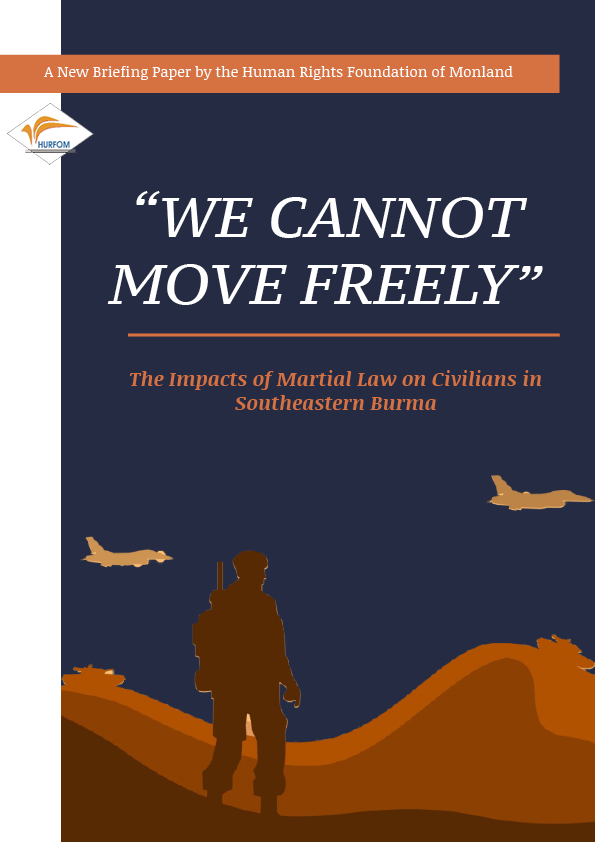
On February 2, 2023, the military junta called a National Defense and Security Council meeting and declared that absolute power was granted to the Commander-in-Chief for the next six months. As of February 3, 2023, the Burma Army had declared martial law in 37 of the 330 townships across the country, including Tanintharyi Region, five townships of Bago Region, Ye Township of Mon State, Kyainseikgyi and Kawkareik townships in Karen State. In Ye, Kyaik Hto and Bilin Townships of Mon State, martial law has been in effect for nearly two years.
“Before declaring martial law in our region [Ye Township], the junta arbitrarily arrested people. They beat innocent civilians and seized their motorbikes. They even killed villagers. But now they’ve declared martial law, so there will be more human rights violations,” said a member of Ye Township Mon Unity Party (MUP). The junta military’s South East Command is now controlling the whole township in the southern part of the State.
Military affairs observers said that the junta’s declaration of martial law in many townships across the country signalled more brutal oppression in pro-democracy groups, civilians, and local resistance armed forces strongholds. However, it also signals that the junta has largely lost control and is taking vengeful steps to try and curb the widespread dissent. The majority population has widely rejected the military’s failed coup. Youth, in particular, have been leading a pro-democracy movement that calls for an immediate end to military rule.
“This martial law decree means the junta will attempt to take complete control brutally and allow their armed forces to oppress more people. There will likely be more war crimes and crimes against humanity in these areas committed by the junta forces,” said a military affairs observer in Ye township.
Martial law grants authority to militarized structures and officials and is typically invoked during intense conflicts. The power granted to the Army essentially gives state-backed soldiers endless jurisdiction to enforce laws and justify them. In Burma, the junta has shown a blatant disregard for the rule of law by villainizing human rights defenders and curbing rights and freedoms. The declaration of martial law is yet another encroachment on the human rights of the people.
The human rights situation in Mon State, Karen State and Tanintharyi region is closely being monitored by the Human Rights Foundation of Monland (HURFOM), an organization founded by exiled pro-democracy students from the 1988 uprisings, recent activists and Mon community leaders and youth. “We Cannot Move Freely” is a briefing paper researched and produced by HURFOM which details how the devastating implementation of martial law impacts civilians in the Southeastern parts of the country.
Martial law in Southeastern Burma
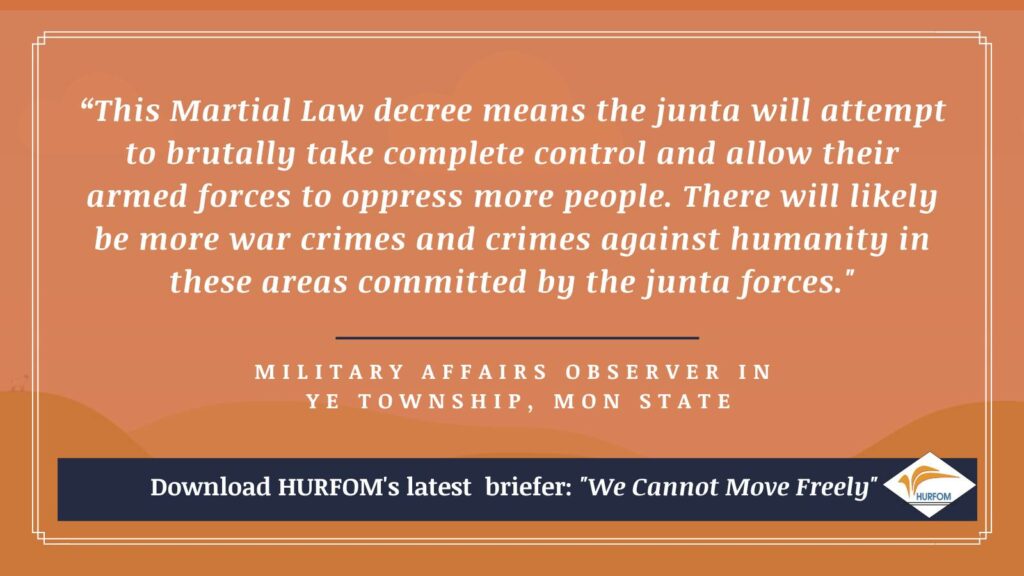
Shortly after the imposition of martial law in Mon State in February 2023, the junta advanced troops into Ye Township. One resident told HURFOM that military movements have increased, particularly at checkpoints. “Security is getting tougher,” said one resident.
Travel restrictions and even bans on carrying food and medicine on motorbikes have come into force. The army is controlling the movement of the people, and the Ye Township General Administration re-issued an order banning residents from going outside from 6 pm to 6 am.
There are criticisms directed at the junta not only because of the restrictions and the impacts on people’s daily lives and livelihoods but also because their sham elections, planned for later this year, are to be held in every constituency in the township.
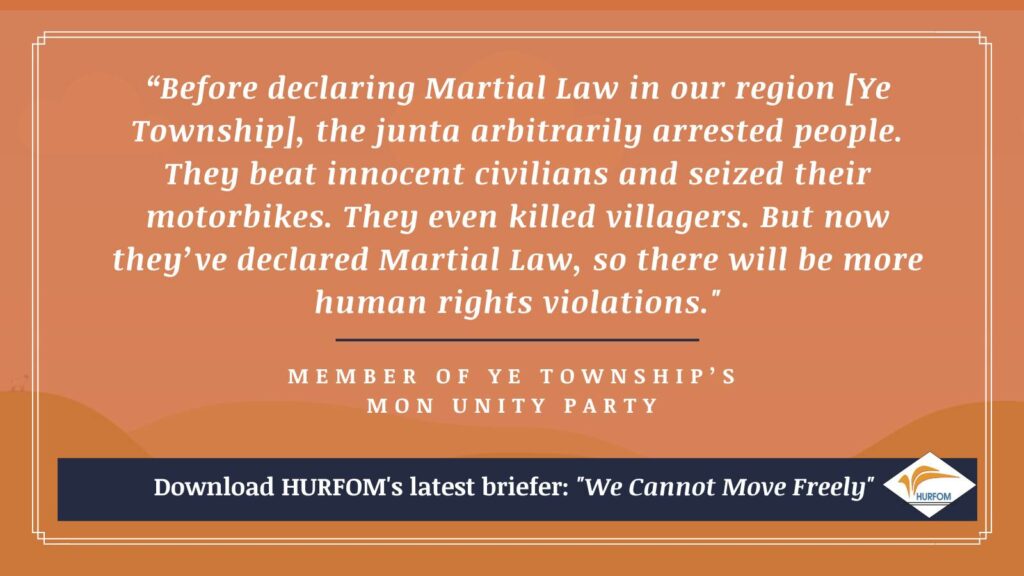
“The military council will hold elections in Ye Township at any cost. That is why they have imposed martial law in the township. The military lost the battle against the revolutionary forces in Ye Township. They are trying to gain control,” commented one Ye resident.
The joint opposition forces, including Mon and Karen ethnic revolution organizations (EROs) and People’s Defences Forces (PDFs), attack the Burma Army often. Even with martial law, the revolutionary forces have not surrendered:
“The fighting will not end any time soon. So, there will be more and more armed clashes,” said a political analyst in Southern Ye Township before adding, “Declaring martial law means waging more war.”
HURFOM spoke to a senior lawyer working to defend those unjustly accused by the junta. She said military impunity encourages the regime to not abide by any meaningful accountability systems.
She told HURFOM: “Martial law is scary; it is more dangerous than the four cuts strategies (cutting off food, shelters, members of armed troops, and information) which we used to face in this region. The application of martial law violates the Constitution. The existing body is useless. There will be no rights of a citizen; the constitution will be set aside and violated under martial law, meaning all people lose their civil rights, rights to life, and freedom of movement. And more worrying, this will enable the continuation of military impunity.”
Impacts on Civilians
The violent enforcement of martial law in Southeastern Burma has devastated the lives of civilians. Reports of increased arrests and abductions have already contributed to a climate of fear and unpredictability.
Extrajudicial killings are among the many crimes being committed by the junta.
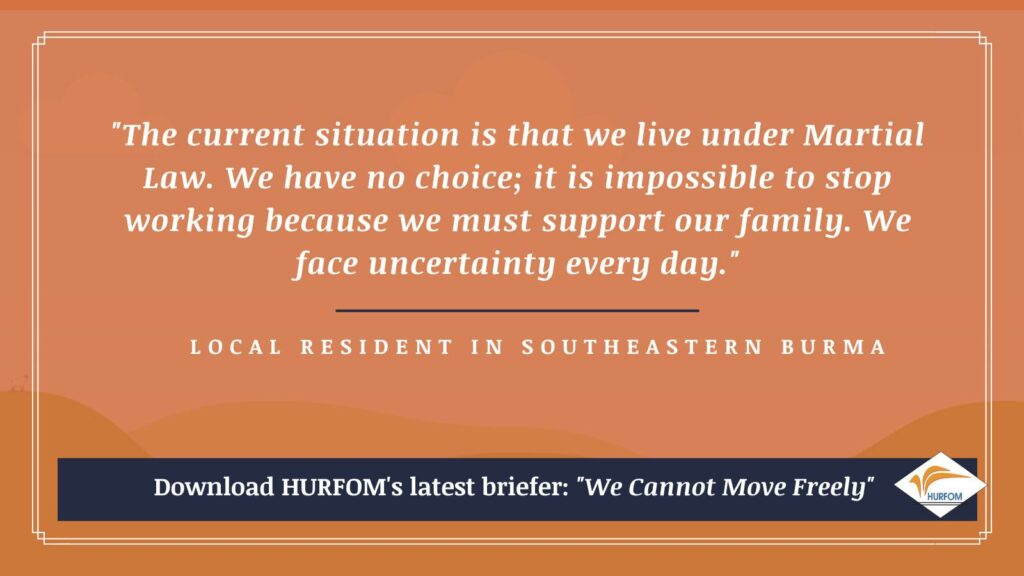
On February 7, 2023, two male villagers were murdered by the Light Infantry Battalion No. 408 and their militias while the victims worked on their plantations in Ya-Ngae village, Thayet Chaung, Dawei. When the bodies were recovered, gun wounds were found on their bodies, as were apparent signs of torture.
Two sources from Ya-Ngae village described that the incidents occurred during the day near Ya-Ngae Village. First, the junta arrested three men on the rubber farm and beat them. One man was released, but the other two detainees, Ko Paing Soe, age 30, and Ko Phyoe Ngae, age 20, were shot dead after being interrogated.
“The current situation is that we live under martial law. We have no choice; it is impossible to stop working because we must support our family. We face uncertainty every day,” said a resident.
Unfortunately, martial law has only allowed the military junta to continue attacking civilian areas. In the southeastern Mon State and Karen State areas, residents have attempted to protect themselves from violence by digging bunkers and foxholes to defend themselves in the event of an attack:
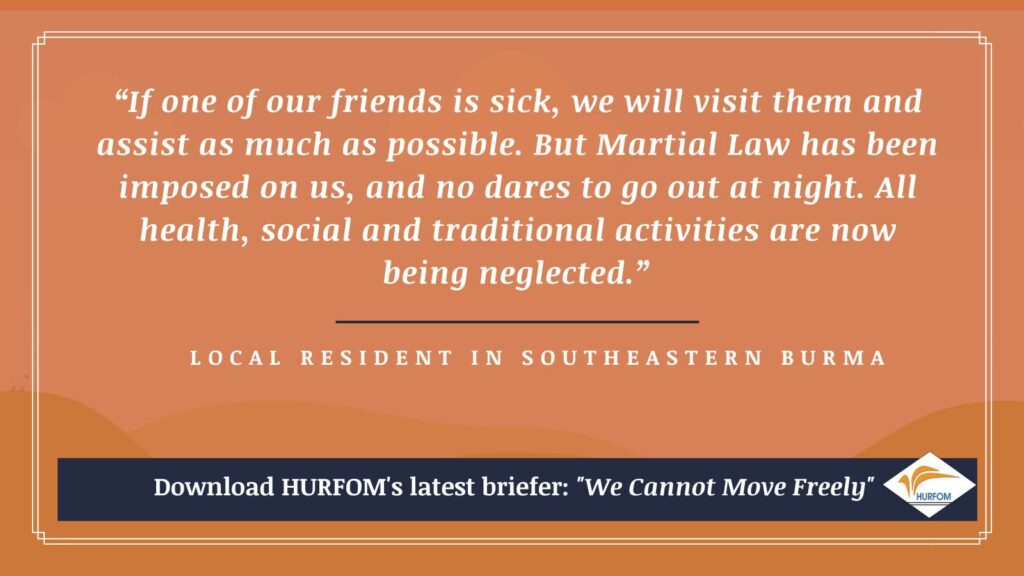
“There are families, children, and the elderly. There will be no time to escape if there is fighting or explosions. At least the bunker can deflect the blast and prevent death and injuries by sheltering in it,” said one villager.
HURFOM reported heavy fighting, which took place between the junta and joint forces of the PDFs from January 22 to 26, 2023, around Kan Ne village, Kawkareik Township, in Karen State and led to 10,000 villagers fleeing. In addition, more than three dozen homes were burned by the regime. They also launched artillery and air attacks during the offensive, mainly targeting villages. Those who fled want to return but fear more armed clashes.
In most townships in Mon State, the junta forces have issued Act #144, which is commonly known as martial law, and bans local people from going outside at night. The impact of the curfew has prevented many from going to their workplaces. It has also discouraged participation in traditional or social activities. The curfews have been particularly disruptive for labourers, including those working on rubber plantations.
“We can’t go to the [rubber] plantation in the morning, and we can’t go outside at night. We can’t move freely, so our business suffers,” said another resident.
Echoing the same sentiment, another villager from Kyaung Ywa, Ye township, told HURFOM, “I haven’t been able to work since the announcement of martial law. I am worried that I will have to face the junta while travelling because I must cross the checkpoints to get to my plantations.”
In addition, interactions with the Junta troops at night can be deadly. On September 23, 2022, a villager from Ka Log village, Southern Ye Township, Mon State, was shot and killed by the military council’s security forces. Soldiers said he breached martial law:
“My rubber plantation is at Thanbyuzayat, and we live in Mudon Township’s Administrative zones. The village’s Administrator granted the proper identification card needed. Still, the junta’s soldiers always stop us at the checkpoints on the way to our rubber plantation,” said another labourer in Kwan Hlar village, Mudon township, Mon State.
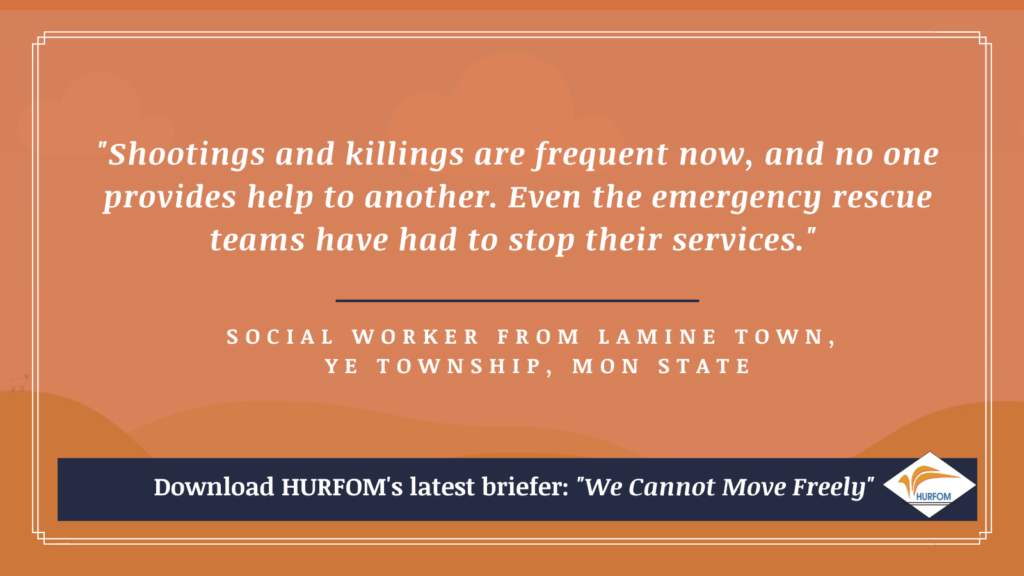
Martial law also impacts social and occupational activities as well as healthcare.
“If one of our friends is sick, we will visit them and assist as much as possible. But martial law has been imposed on us, and no dares to go out at night. All health, social and traditional activities are now being neglected,” said a local who wished to remain anonymous.
“Those with emergency health problems are in trouble at the moment. Even if they have an illness, they dare not go to the clinic at night as they’re afraid of the military. Shootings and killings are frequent now, and no one provides help to another. Even the emergency rescue teams have had to stop their services,” said a social worker from Lamine Town, Ye township, Mon State.
The scaled-up violence and brutality of the military junta continue because of deeply engrained impunity. The regime has been emboldened to routinely disregard the law because the international community has failed to hold the soldiers accountable.
The junta-backed soldiers based in areas such as Light Infantry Battalion (LIB) No. 556, LIB 557, LIB 558, and Artillery Regiments Command No. 306 are the main perpetrators, according to the team receiving the military information from the local armed forces.
Conclusion
HURFOM remains seriously concerned about escalating human rights violations in Southeastern Burma. Terms like “in accordance with the law” or “in accordance with democracy” have frequently been used by the junta to justify their illegitimate rule. Martial law legally allows using of power to oppress the civilians like this. The imposition of martial law in Southeastern Burma threatens the rights of all people in Burma. The culture of impunity must end.
Comments
Got something to say?
You must be logged in to post a comment.



















































